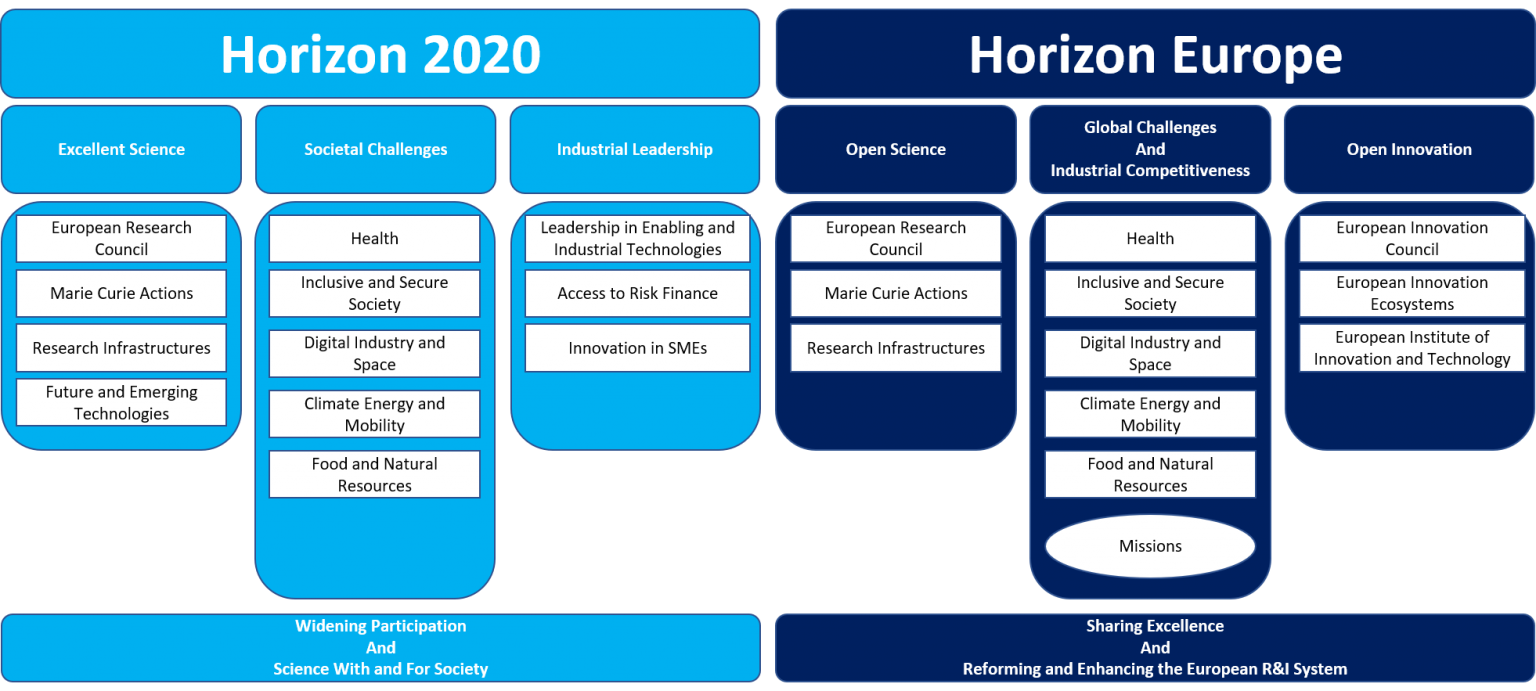RINNO’s Antonia Egli (DCU) joined Horizon Europe’s Irish launch event and explains this new funding body’s impact on EU research initiatives.
On March 25th, 2021, Horizon Europe was launched in Ireland. The virtual event brought together over 2,000 international viewers and welcomed notable speakers such as Mariya Gabriel, European Commissioner for Innovation, Research, Culture, Education and Youth, and Simon Harris, Irish Minister for Further and Higher Education, Research, Innovation and Science. But what can future scientific ventures expect from this new funding body? Read on for an overview of the revised funding pillars and learn what this development means for research within the EU.
First And Foremost: What Is Horizon Europe?
Horizon Europe is a 7-year scientific research initiative established by the European Union which, thanks to a budget of €95.5 billion, aims to raise the spending levels of EU science projects by 50% between 2021 and 2027. This makes it the EU’s key funding programme and arrives as Horizon 2020, the initial funding source of RINNO, comes to an end.
What’s The Difference Between Horizon 2020 and Horizon Europe?
Not much has changed between the two. Rather than being seen as a replacement for Horizon 2020, Horizon Europe should be viewed as an evolution of the funding branch over the next seven years.
One particular difference, however, is visible in the funding pillars on which the programme is based. These have developed to now include Excellent Science, Global Challenges & European Industrial Competitiveness, and Innovative Europe. As introduced on the recently launched Horizon Europe website, these pillars mainly differ from the previous Horizon 2020 programme in their focus on fostering innovation environments instead of industrial leadership. This is further highlighted in the creation of the European Innovation Council, which offers innovation support for ventures deemed too risky for private investors in the form of a €10 billion budget.

Structural Changes In The Horizon 2020 and Horizon Europe Funding Bodies (© MODUS Research & Innovation)
What Do These Changes Mean For Researchers?
Researchers should note that Horizon Europe now follows an open science policy, meaning that mandatory open access to publications and open science principles are implemented throughout.
The first pillar, as introduced to viewers of the Horizon Europe launch event by Peter Brown, Director of the Irish Research Council, and Dr Geraldine Canny of the Irish Universities Association, is Excellent Science, and focuses on the continued support and creation of research infrastructure within the EU. A key actor within this pillar’s plan remains the European Research Council (ERC), which supports frontier research by fostering competition on a European scale. This takes the form of around €16 billion in long-term grants for individual, bottom-up research in life, physical and social sciences. It is combined with a second research fund, the Irish Marie Sklodowska-Curie Office, which supports research in preparing funding applications, contributing to policy initiatives and promoting MSCA programmes. In a Horizon 2020 context, this fund secured around €64 million for structured PhD programmes (of a total budget of €6.6 billion) and 450 funded research projects with over 1,400 intersectoral researchers in total.
The second pillar, Global Challenges & European Industrial Competitiveness, is slightly more complex, as it includes initiatives embedded within various business sectors. A selection of the pillar’s research focus areas, or ‘Destinations’, as introduced by the Irish Research Council and Enterprise Ireland, includes:
- Health:
- Staying healthy in a rapidly changing society;
- Living and working in a health-promoting environment;
- Tracking diseases and reducing disease burden.
- Culture, Creativity and Inclusive Society:
- Innovative research on democracy and governance;
- The European cultural heritage and creative industries;
- Social and economic transformations.
- Civil Security for Society:
- Better protection against crime and terrorism;
- Effective management of EU external borders;
- Resilient infrastructure;
- Increased cybersecurity.
- Digital, Industry and Space:
- Climate neutral, circular and digitised production;
- World leading data and computing technologies;
- Human-centred and ethical development of digital and industrial technologies.
- Climate, Energy and Mobility:
- Climate science and responses;
- Sustainable, secure and competitive energy supply;
- Efficient, sustainable and inclusive energy use;
- Safe, resilient transport and smart mobility services.
- Food, Bioeconomy, Natural Resources, Agriculture and Environment:
- Biodiversity and ecosystem services;
- Fair, healthy and environmentally-friendly food systems;
- Circular economies, clean environments and zero pollution;
- Land, oceans and water for climate action.
The third pillar, Innovative Europe, is introduced by Professor Mark Ferguson, Director General of the Science Foundation Ireland, and Jill Leonard of Enterprise Ireland. A key development here is the European Innovation Council, Europe’s flagship innovation funding programme and the EU’s largest innovation initiative to date, with a budget of €10 billion for the period 2021-2027. These offer a range of support and grant funding both for SMEs and founders in their beginning phases, researchers transitioning from academia to business, and fully fledged innovation drivers on a European level.
A short overview of the Horizon Europe launch can be viewed here.
RINNO is a Horizon 2020 project that aims to considerably accelerate the rate of deep renovation in the EU by reducing the time, efforts, and costs involved. We strive to deliver a set of efficient, environmentally friendly, multi-functional, and easily applicable construction-related innovations that are geared in favour of a more sustainable future in the Irish economy.
To keep up to date with project updates you can following H2020-RINNO on Twitter, LinkedIn, Facebook. You can also sign up to receive email updates:


 This project has received funding from the European Union's Horizon 2020 research and innovation programme under grant agreement No 892071.
This project has received funding from the European Union's Horizon 2020 research and innovation programme under grant agreement No 892071.